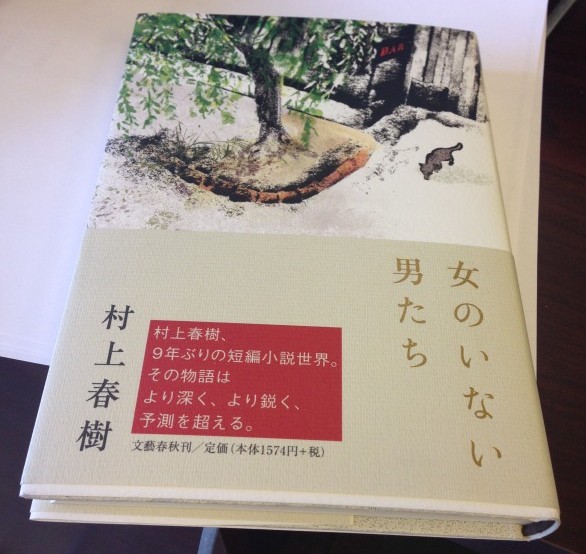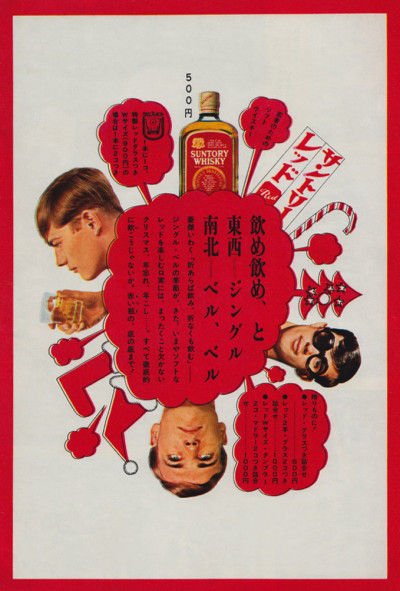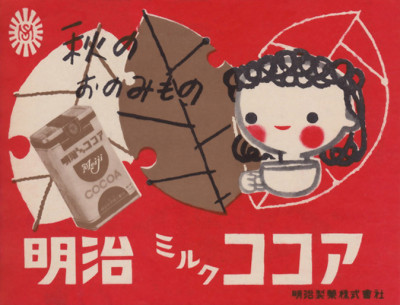Welcome to the Seventh Annual How to Japanese Murakami Fest!
With the goal of stirring up even more interest in Murakami between now and October, when the Nobel Prizes are announced, I will post a small piece of Murakami translation/analysis/revelation once a week from now until the announcement. You can see past entries in the series here:
Year One: Boobs, The Wind, Baseball, Lederhosen, Eels, Monkeys, and Doves
Year Two: Hotel Lobby Oysters, Condoms, Spinning Around and Around, 街・町, The Town and Its Uncertain Wall, A Short Piece on the Elephant that Crushes Heineken Cans
Year Three: “The Town and Its Uncertain Wall” – Words and Weirs, The Library, Old Dreams, Saying Goodbye, Lastly
Year Four: More Drawers, Phone Calls, Metaphors, Eight-year-olds, dude, Ushikawa, Last Line
Year Five: Jurassic Sapporo, Gerry Mulligan, All Growns Up, Dance, Mountain Climbing
Year Six: Sex With Fat Women, Coffee With the Colonel, The Librarian, Old Man, Watermelons

From Bill Gracey‘s photostream.
Welcome back! As with last year, my laziness continues. I will pull the starter cord on the rusty (but trusty) lawnmower that is my close reading of Hard-boiled Wonderland and the End of the World and read through a few more chapters to examine changes that Murakami made for the Complete Works edition and adjustments made by Birnbaum (or his editor) (BOHE) in translation.
Chapter 18 “Dreamreading” is an appropriately short chapter for me to get back in the swing of things. It’s only five pages in the “Complete Works” edition and just a bit longer in the paperback. No major changes between those additions, and BOHE didn’t make many either.
There are a few minor adjustments in translation of course, as there are with any translation, and many of these would vary with any translator. But they’re still fun to look at.
In this chapter, Boku describes his frustrations with the dreamreading process, reads a few dreams, and discusses his frustrations with the Librarian. Her job is to wipe down the unicorn skulls—the dreams—after he has brought them from the stacks and to serve him coffee when he’s finished. Birnbaum renders this in a wonderfully clean translation:
I select a skull from the long shelves and carry it to the table. She helps me, first, to wipe off the dust with a dampened cloth. With meticulous care, she then polishes it with a dry cloth until the skull becomes like sleet. (183)
Murakami’s Japanese, however, is a bit more decorated:
僕は見わたす限りの書架に並んだ古い夢のうちのひとつを手にとり、そっと抱えるようにしてテーブルに運んだ。それから彼女に手伝ってもらってほんの少し水で湿らせた布でほころと汚れを拭きとり、次に乾いた布で時間をかけてごしごしと磨いた。(249-250)
I take one of the old dreams lined up endlessly along the shelves and, cradling it gently, bring it to the table. Then she helps me to wipe off the dust and dirt with a slightly dampened cloth, and then to carefully polish it with a dry cloth.
BOHE simplifies “lined up endlessly along the shelves” to “from the long shelves.” “(just) slightly dampened cloth” becomes “dampened.” And the “cradling” gets cut completely. But he adds in the description of the skull like “sleet.” The result is much sparser, simplified translation. This results in other great passages such as the following:
At the end of each session, she serves coffee. Occasionally we share biscuits or fruitbread she bakes at home. We do not speak as we eat. (184)
That line hit me when I was reading the translation.
There is one very small cut later in the chapter that I think does more damage to one of Murakami’s main themes in this book (and in many others): warmth (ぬくもり).
When they finish in the Library, Boku and the Librarian walk through the Town again:
As always, we sit on the narrow steps that lead from the Old Bridge down to the sandbar. A pale silver moon trembles on the face of the water. A wooden boat lashed to a post modulates the sound of the current. Sitting with her, I feel her warm against my arm. (185)
Again, a great translation, and I think he ends it on a nice point that shows more than tells. Murakami goes on for a few more sentences:
我々はいつものように旧橋のまん中にある中洲に下りるための階段に腰を下ろして、川を眺めていた。冷えびえとした白い月が小さなかけらとなって川面で小刻みに揺れていた。誰かが中洲の杭につないだ細い木のボートが水音を微妙に変えていた。階段の狭いステップの上に並んで座っているせいで僕は肩口にずっと彼女の体のぬくもりを感じていた。不思議なものだ、と僕は思った。人々は心というものをぬくもりにたとえる。しかし心と体のぬくもりのあいだには何の関係もないのだ。(252)
As always, we sit on the steps that descend from the middle of the Old Bridge to the sandbar and watch the river. The frigid, white moon breaks into small pieces and flutters on the surface of the water. Someone has tied up a flimsy, wooden boat to a post on the sandbar, and it slightly alters the sound of the water. Perhaps because we are sitting next to each other on the narrow steps, I feel her warmth in my shoulder the whole time. It’s strange, I think. People always think of the mind as warmth. But warmth of the mind and warmth of the body are completely unrelated.
I’ve maintained Birnbaum’s translation of kokoro here with “mind,” but this is one spot in particular where “heart” might make more sense. Birnbaum has made other modifications to keep his same spartan translation style (for example, moving the “narrow” to the first sentence in the paragraph from the fourth), but he just cuts the final three sentences completely.
In an MFA workshop, those are the sentences someone would have marked as “Show don’t tell” or “Too on-the-nose,” I guess. (There have been a surprising number of references to MFA workshops in the reviews of Tsukuru Tazaki. Mostly in regards to stilted dialogue or strange wordings.)
I also have a feeling that Murakami will address this mind-body divide later in the book, so it might not be totally necessary to introduce it so explicitly right now.
In the end, I attribute this slight change to Birnbaum’s major decision to translate kokoro as mind rather than heart. I think it works perfectly in most of the rest of the novel, but here I think the line “People always think of the mind as warmth” in particular feels a little off. “People always think of the heart as warmth,” on the other hand, feels a little more natural.






